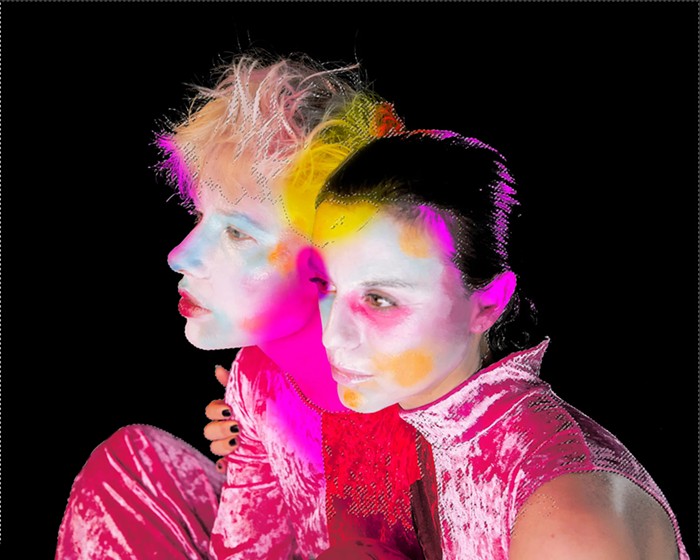There's not a single inch of space available on the Comet's dance floor, but people still keep shifting and shoving their way through the crowd, hoping to get just a step or two closer to the bar's corner stage. On the small stage sits an orphaned array of instruments and toys—tambourines, guitars, keyboards, synthesizers, drums, drum and smoke machines, spinning disco lights, and enough wires to tie a giant bow around the city of Seattle.
Someone starts rhythmically chanting "U! S! E!" and the rest of the room quickly joins in. "U! S! E! U! S! E! U! S! E!"
The overhead music turns off. To the left of the stage a black curtain gets pushed out of the way, and seven obviously anxious musicians pour out from behind it, onto the Comet's makeshift stage. They're all smiles as they reach for their instruments, and they're unable to stare at the crowd for more than a second without looking at one another in bewilderment.
Singer Jason Holstrom, head crowned by shaggy blond hair, thanks everyone for coming out. "It's been a while since we've done this," he says. He strums his guitar once or twice and the crowd responds with an explosion of cheering and applause. Keyboardist Noah Weaver and drummer Jon e. Rock pound into the intro of "Party People," and bassist Derek Chan and guitarist Peter Sali add bouncing bass and choppy guitar to the band's notoriously disco-influenced dance track. The Flava Flavs of the group—dancers and covocalists Carly Nicklaus and Amanda Khanjian—further hype the crowd, calling for dancing, and for a minute it's ecstasy—lights are spinning, there's confetti in the air, attractive Capitol Hill hipsters with angular haircuts are dancing next to coy indie boys in sloppy shirts, and photographers line the front row, cameras flashing, hoping to capture the moment on film (or memory card).
Then boom. Pow. Black. The lights go out and the room falls suddenly silent. U.S.E's setup overworked the bar's fuse box and the band are stopped dead in their tracks.
How appropriate.
![]()
Two years ago, one would be hard-pressed to think of a Seattle band being ushered unto the masses with as much exciting momentum as U.S.E. Case in point: In April 2005, former Stranger music writer Dave Segal traveled to Japan with the group as they took a six-day mini tour through Osaka and Tokyo. "After charming several major-label reps at SXSW in March and scoring a hit single in Japan earlier this year, and hot on the heels of Sonic Boom Records' reissue of U.S.E's self-released, eponymous debut, the fun-loving septet are poised to become Seattle's next breakout act," he wrote.
They filled a niche in the city—their music wasn't mopey, dramatic, hard, or edgy, unlike so many of their local peers. It was fun, plain and simple. U.S.E made light-hearted dance music dripping with love and sincerity, held together with glitter, catchy riffs, and manipulated computerized vocals that carried—and evoked—the same wide-eyed childlike energy of Disney's Electrical Parade.
Their momentum was full throttle. Northwest supporters projected U.S.E to be the next Scissor Sisters or maybe even ABBA. Fans anxiously awaited a follow-up record to their debut.
The international-stars-to-be never delivered. After a four-year streak as one of Seattle's most surprising breakout bands, the power went out on U.S.E.
"We kinda needed a break," says Nicklaus, just days after the Comet show. "We weren't getting pressure from anyone or anything in particular..."
"It got pretty intense," Holstrom says, finishing her thought. "We toured a lot and only had one album out. We got frustrated by that, and writing became challenging."
"Yeah, and everyone's like, 'Put out a record, put out a record!'" Nicklaus continues. "But I think we just really had to do things our way. We were definitely not making the smartest choice as far as business goes. Everyone was saying 'You've got all this momentum going...' and people still don't understand why we didn't [release a record], but we just did what we had to do. You just can't force it."
Heeding their own advice, after a late-spring show at the University of Washington last year, the band went on hiatus. But a planned two-month vacation—downtime to allow U.S.E's members to focus on their other bands and/or get married (three of the seven tied the knot in the last 12 months)—snowballed into a year.
"[The break] was supposed to be until Amanda got back from her honeymoon, around mid-September," explains Nicklaus.
"Then there were the holidays..."
"And we didn't have a practice space, 'cause we moved out of ours," adds Holstrom. "So we had to get a space and that took a couple months."
"It takes us a long time to do everything," laughs Nicklaus. "We do not have a leader of the band; we don't have anyone that tells us what to do."
"Everyone has an equal voice," Holstrom says with a nod, "so it really makes it a challenge to make a decision."
Indeed. All of U.S.E (minus Sali, who couldn't make it) are cuddled around a table at a Capitol Hill coffee shop, not far from the band's practice space, where U.S.E dedicate two nights a week to songwriting. Unlike at the Comet just a couple nights ago, the band aren't sparkling with flashes, confetti, and colored lights. They're calm, drinking peppermint tea, cappuccino, and lattes while talking about how they unwittingly became the stars of last weekend's much-hyped reunion show and, more importantly, what lies ahead.
But instead of one or two people speaking up on behalf of all the band members (as will often happen in larger group interviews) U.S.E's responses are cluttered with half-finished thoughts, and their words ricochet off one another.
"We're seven people with a hundred ideas," Nicklaus finally explains.
"We've been working hard on the new Wonderful album," says Holstrom about the poppy prog-rock band he's in with U.S.E bandmates Weaver, Rock, and Sali.
"We started several other bands in the last year, too," confirms Weaver. "Night Dance, which is basically Wonderful plus a couple other members, including Shane [Berry] from the Divorce. It's somewhere between Wonderful and U.S.E—it's mellower dance stuff—samba/bossa nova influenced. Sorta like sultry nighttime dance kind of thing. And we started an actual bossa nova band in January with Anna Banana from the Pretty Parlor."
"And the Catch is writing, and we recorded some stuff," adds Nicklaus about her new-wavy pop-punk band, which already has an album out on Made in Mexico Records.
On top of that, Holstrom and Nicklaus have recently started exploring R&B sounds in yet another project ("We haven't gotten very far, but the tracks we have are pretty sweet," says Nicklaus), and just recently Holstrom released an "island Hawaii love album" under the name the Thieves of Kailua.
And if that weren't enough, Holstrom also produced the new Aqueduct album, Or Give Me Death, as well as the yet-to-be-released Dolour full-length, which is actually a double disc.
After running down the list of projects, Holstrom grins. "We love making music."
![]()
U.S.E haven't been anywhere; they've been everywhere. Which is probably why the band were so surprised when they started hearing people refer to their "secret comeback" show as a reunion, implying that the band had broken up. Technicalities aside, the city was undeniably stoked about the rumors of U.S.E's "big return."
The show was supposed to be a secret—the band booked an unannounced slot with the Lashes and the Catch, wondering if anyone would even care after their year of silence. But then the fliers hit light posts all over Capitol Hill: "If you heard that U.S.E is playing the Comet this Friday, please don't tell anyone!! It is a secret." Hardly. The secret was out and that night the Comet was packed—sold out before the Lashes even started.
"I was so nervous," Khanjian admits, "but we showed up and started setting up and it just felt so normal and natural again. It was amazing."
"It was the perfect scenario," agrees Weaver. "I wasn't nervous about the show but I had no idea, after not playing a show for a year, if we'd remember or if anybody else would remember what to do at a U.S.E show. But as soon as it started, everything came flooding back and it was totally natural."
Once the band got the power working again (by killing the smoke machine and extra lights), the show went off without a hitch. And now that they've come back, they don't plan on going anywhere—the band are currently writing new material for another record, though it's still too early to say when it'll be finished and who will release it.
"We're definitely working on U.S.E two nights a week, every week," confirms Holstrom. "Probably more, eventually."
"We're trying to set realistic goals of getting the record done as fast as we can without rushing anything at all," adds Nicklaus.
Khanjian nods. "You can pressure something too much, you know? We don't want to push it."
Weaver looks up from his empty coffee cup and smiles. "We want to keep it a party!"
Once it becomes a job, it's no longer U.S.E—fan expectations and major-label interest be damned. But now that they've had a chance to reenergize, the seven artists are ready to get hyped all over again. You can take U.S.E out of the party, but you can't take the party out of U.S.E. ![]()



















